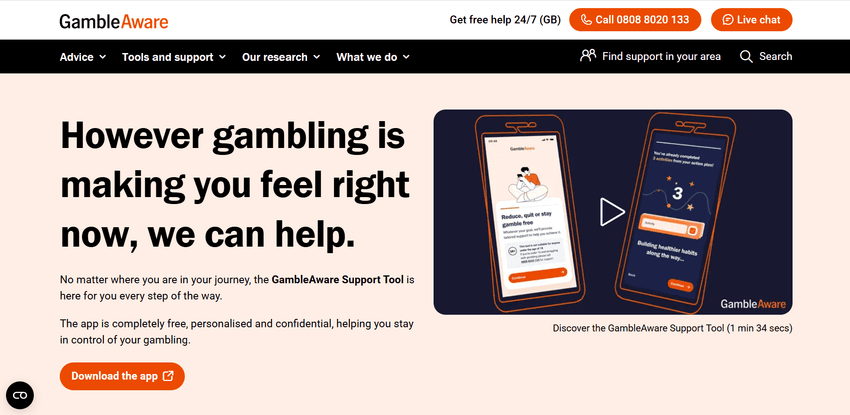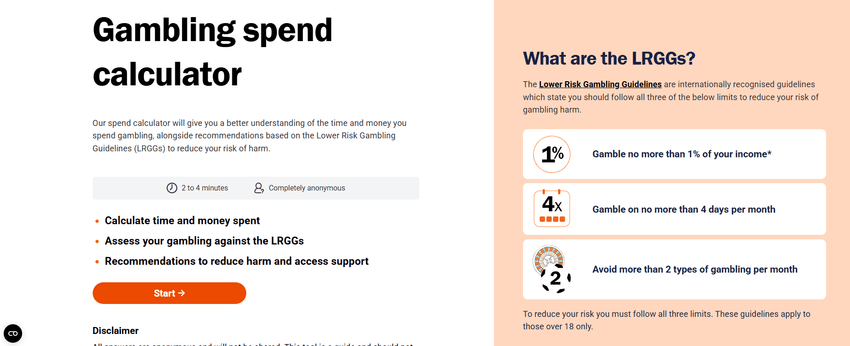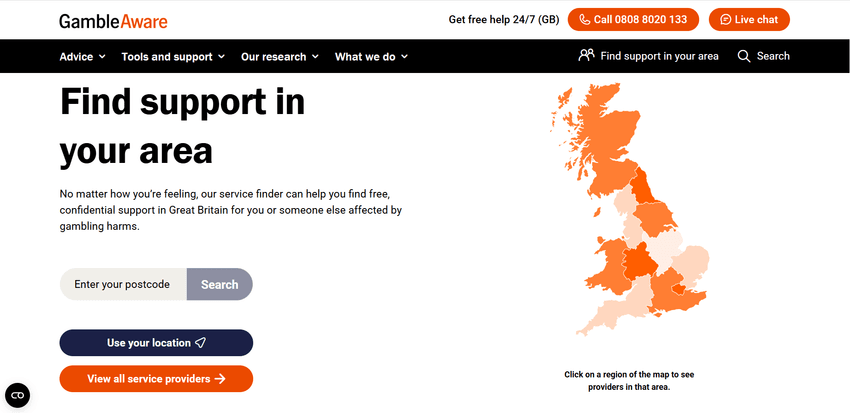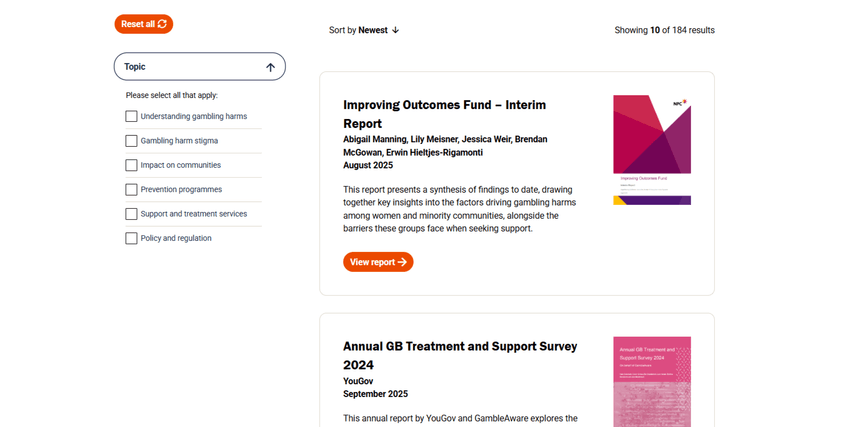GambleAware: A Standard in Responsible Gambling in 2026
BeGambleAware.org was a charity that supported individuals struggling with compulsive or problem gambling.
GambleAware provided treatment for those experiencing gambling harm. It ran public health campaigns and offered confidential support through a helpline. It addressed these issues head-on by identifying the different problems associated with gambling addiction.
GambleAware has dedicated educational resources, research findings, and information to promote responsible gambling in England, Scotland, and Wales. Other organizations providing similar services include GamCare and Gamblers Anonymous.
Contents
As you might have already heard, by March 31, 2026, GambleAware is going to stop offering its services for mitigating problem gambling. According to BeGambleAware official site, this decision comes as the UK implements a new statutory framework for dealing with gambling-related harm, which GambleAware has advocated for.
GambleAware proactively engaged with individuals and communities, emphasizing gamble awareness, addiction prevention, treatment, evidence-based advice, tools, and 24/7 support. If you or someone you know is dealing with the serious consequences of compulsive gambling or ludomania, be sure to seek help.
What set this body apart from others was its focus on early intervention and support strategies for individuals at risk, as well as those who struggled with addiction. With targeted campaigns, educational materials, and outreach initiatives, the organization destigmatized conversations about addiction and promoted responsible gambling behavior. Just like Gam-Anon, it offered support and guidance for family and friends of gamblers.
About GambleAware
The prevalence of gambling, both online and in traditional settings, has presented significant challenges for those who are susceptible to its addictive nature. To counter any gambling-related harms, the leading independent charity GambleAware.org provided special resources and tools. It sought to help individuals understand the risks, make informed decisions, recognize the signs of problem gambling early, and stop when they needed to.

Here we’ve gathered official, registration-related data that you should be aware of:
Launched in | 2002 |
|---|---|
CEO | Anna Hargrave |
Directors | Boucher, Andrew Paul |
Company Address | 5th Floor, Lincoln House, 296 - 302 High Holborn, London, WC1V 7JH, UK |
Began as | Gambling Industry Charitable Trust |
Registration Details | Company Number in England: 04384279 Company Number in England and Wales: 1093910 Scottish Charity Number: SC049433 |
GambleAware.org was created to address the rising worries about gambling addiction and its effects on people and communities. It was founded with a clear purpose: to promote responsible gambling practices and provide assistance to sufferers. Here is the video about its mission and services.
History and Growth
Since its establishment in 2002, GambleAware underwent notable growth and transformation. Originally, it was a small initiative, similar to ICRG, but it evolved into a globally acknowledged leader, impacting millions around the world.
The organization offered essential support to those looking for help with their gambling habits through resources, including helplines, counseling services, educational materials, and online tools. It believed that those who were gambling aware would make fewer mistakes that could harm them when they played at a casino or made bets.
Gambleaware.org expanded its reach and impact in the fight against gambling addiction via:
- strategic partnerships and collaborations with industry stakeholders,
- advocacy groups,
- government agencies.
Key Achievements and Impact
Over the years, GambleAware reached several milestones in its mission to promote responsible gambling. Notable achievements included:
- Nearly 10,000 people received free, confidential treatment annually.
- Out of those who completed treatment, 95% reported an improvement.
- The National Gambling Helpline registered a record 55,228 interactions through phone calls and online chats.
- GambleAware Community Resilience Fund supported over 15,000 people with gambling harm awareness and early intervention.
- Brief interventions, typically a short conversation to reduce risk of harm, saw an increase of 93%.
Partnerships and Endorsements
GambleAware forged strategic partnerships with multiple organizations, including the National Gambling Support Network, gambling operators, healthcare providers, advocacy groups (lived experience community), and educational institutions. These collaborations have been crucial in amplifying the organization’s message and reaching out to audiences.
Here, in the table below, we’ve listed the partnerships GambleAware ran:
Stakeholder Type | Examples |
|---|---|
Educational Institutions |
|
Lived Experience Council |
|
Healthcare Providers (UK) |
|
Government (UK) |
|
What Happens to GambleAware in 2026?
Support from important government agencies and well-known companies in the gambling sector reinforced GambleAware’s trustworthiness. As the organization evolved alongside the changing gambling landscape, its dedication to fostering responsible gambling was steadfast. By focusing on innovation, partnerships, and community involvement, the organization advanced its mission to establish a safer, healthier gambling environment for everyone.
Until April 2026, the organization will continue to provide assistance to all those in need. Over its many years, it has helped thousands of gamblers and keeps all its research, resources, and services openly accessible. The UK government and newly appointed commissioners will continue to deliver support in the same way GambleAware has.
Funding Model
GambleAware was an independent charity with a funding model based on voluntary donations qualifying as RPT contributions, regulatory settlements, and donations of unclaimed winnings, dormant accounts, or similar.
Bet365, William Hill, 888 Holdings, and other major operators contributed financially to GambleAware through a voluntary donation system.
However, Gambleaware.org maintained a strict policy of independence from the gambling industry to ensure its research and treatment decisions are not influenced by its funders. The organization has long advocated replacing this voluntary system with a statutory levy. It believes this is necessary to ensure funding is consistent and transparent.
The new statutory levy is expected to generate up to £100 million a year for initiatives to combat gambling-related harm. This is a significant shift towards a public health-led approach to tackling gambling issues, a move that GambleAware actively supported.
On April 6, 2025, the Gambling Commission assumed the power to charge a levy on the Gross Gambling Yield (GGY) of all UK gambling operators annually. These funds were used to commission a comprehensive range of services, including:
- Funding the National Gambling Support Network
- Supporting public health campaigns and educational programs
- Commissioning independent, evidence-based research
GambleAware has partnered with banks on a whole-system approach to support those at risk, and many UK banks, including Barclays, HSBC, and Santander, have introduced tools such as gambling transaction blocks.
Governance Structure
GambleAware was governed by an independent Board of Trustees, which was responsible for the charity's strategic direction and governance. The board was structured to have a majority of trustees from outside the industry.
A key component of their management was the principle of commissioning services on market terms. This meant that, although funding came from the gambling industry, decisions about what services to commission and how to deliver them were made only by GambleAware’s trustees and executive team. This prevented any conflicts of interest and ensured that actions were directed toward the public good.
Interaction with Government, Regulation, and Policy Bodies
Studies conducted by GambleAware remain an important resource for policymakers and regulators, as they help stakeholders understand the harm caused by gambling and provide a basis for evidence-based policy development.
GambleAware delivered expert consultation to government agencies, including the Department for Digital, Culture, Media and Sport (DCMS) and the Department of Health and Social Care (DHSC). Additionally, the organization worked closely with the Gambling Commission, the UK’s gambling regulator, to help implement effective consumer protection measures.
Stats Related to GambleAware Activities
- According to GambleAware’s 2024 Annual Treatment and Support Survey, nearly one in three adults (30%) experiencing any level of gambling problems are seeking treatment or advice.
- GambleAware reported a 12% increase in support or treatment in 2023–2024.
- The two-year ‘Bet Regret’ campaign, targeting young men, found that 17% of those surveyed actively tapped out of betting apps before placing a wager they might have regretted. 53% of the higher-risk audience indicated an intention to reduce their betting activity.
- Finding stigma is a major barrier to seeking help. GambleAware launched the Stigma Reduction Campaign to encourage open conversations about gambling harms.
- GambleAware launched its first national campaign specifically targeting women. 210.8 million people were reached by the media coverage. The Women’s Campaign has brought over one million visits to the GambleAware.org website.
- Scottish Gambling Education Hub has trained staff from over 550 organizations, and its Gambling Education Toolkit has been downloaded 5,000+ times. More than eight in ten young people who engaged reported becoming more aware of gambling harms.
GambleAware Tools and Support Services
Gambleaware.org provided critical services and resources that enabled people to make positive changes in their lives, seek help, and regain control of their gambling habits.

Here’s a list of the GambleAware services.
Reduce or Quit Gambling App
The organization launched a free app based on the Lower Risk Gambling Guidelines. It was designed to help individuals reduce or completely stop gambling. It offers personalized tools, progress tracking, and behavior change exercises to build healthier habits.

Here are the links to the app:
Other Self-Assessment and Control Tools
GambleAware developed an online self-assessment tool titled Gambling Harms Assessment that helps users understand how gambling may be affecting their finances, relationships, or well-being. The test results guide the next steps toward seeking help.

Another development is the Gambling Spend Calculator. This tool helps gamblers calculate how much money and time they’re spending on their hobby. It gives a clear picture of users’ gambling patterns and assists in setting limits or reduction goals.

The organization also provided GambleAware self-exclusion tools, enabling individuals to step back from gambling activities. These helped them break the cycle of compulsive gambling and establish a barrier to accessing gambling websites. GambleAware created gambling blocking and self-exclusion guidance on how to block access to gambling websites and apps with Gamban, and how to self-exclude from betting platforms with GAMSTOP.
Additionally, in the section dedicated to limiting gambling ads online, the organization gathered instructions for reducing exposure to gambling advertisements across social media, search engines, and streaming platforms.
Counseling Services
GambleAware.org offered confidential counseling services for individuals affected by gambling addiction. Trained professionals provided:
- education,
- tailored interventions,
- emotional support,
- practical strategies, and
- therapeutic guidance.
The “Support in Your Area” section displayed a directory designed to help people find free, confidential support services nearby. It connected users to local organizations specializing in gambling recovery.

These services helped individuals understand and manage their gambling behaviors, regain control, and address the underlying issues driving their addiction.
Helplines
The organization previously operated 24/7 helplines staffed by trained counselors, ready to provide immediate help and crisis intervention for individuals in need. The core partner, National Gambling Support Network, is a UK-wide network offering free and confidential treatment for anyone impacted by the consequences of problem gambling.
NGSN treatment programs include:
Therapy and counseling | GamCare, ARA Recovery for all, and RCA |
Peer support | |
Residential centers | |
Services specifically for women | Betknowmore and Breakeven |
For free help 24/7, call +44-808-8020-133 or use live chat. The helpline ensures a private and supportive environment for callers in which people could discuss their concerns, gather information, and be referred to appropriate services.
Educational Materials
BeGambleAware.org published a wide range of educational materials, including:
There was a whole publication library with research into understanding gambling harms, stigma, impact on communities, prevention programs, support and treatment services, and policy and regulation.

What’s more, on the Resources for Professionals page, there were various educational materials, clinical guidance, and training for professionals working with individuals experiencing gambling-related detrimental effects.
These offerings resembled the resources available through 800gambler.org, yet they were more detailed. This was done to raise awareness about responsible gambling and the potential risks of excessive activity.
Online Forums and Support Groups
The community also featured online forums and support groups that connect individuals grappling with gambling addiction. Similar to GamTalk’s offers, its moderated web forum provided anonymous, non-threatening peer-to-peer support for individuals who wanted to change their relationship with gambling, share experiences, seek advice, track recovery, and get encouragement.
Moreover, GambleAware helped connect individuals and local support groups. There were various options, ranging from self-help and peer-led groups to professionally led therapy and multistep recovery programs.
Family Support Services
The organization offered support to family members and friends who were affected by a loved one’s gambling addiction. Family support services included education, resources, and counseling to help families cope with the effects of gambling addiction and help their loved ones recover.
There was also a Referring a Patient to Support option. It provided guidance for healthcare professionals, social workers, and advisors on how to refer individuals to the National Gambling Support Network or local treatment services.
Engagement and Outreach Strategies by GambleAware
Through engagement and outreach strategies, GambleAware.org actively promoted responsible gambling practices, raised awareness about gambling-related harm, and provided support to individuals and communities affected by gambling addiction.
Direction | Description | Examples |
|---|---|---|
Public Health Campaigns | These campaigns raised awareness about responsible gambling practices, highlighting the potential risks of excessive gambling, and promoting support services offered by the organization. | Let’s open up about gambling: A campaign for reducing the stigma that prevents people from talking about gambling. Bet Regret: A campaign targeting younger male sports bettors to encourage safer habits. Women’s Campaign: The first national campaign specifically designed for women. |
Workshops & Webinars | These were events for professionals, researchers, and policymakers. They covered problem gambling identification and harm minimization measures. | Annual GambleAware Conference: An event that brought together experts to discuss the latest research and policy developments. Research-specific webinars: Sessions dedicated to presenting the findings of commissioned research projects. |
Community Outreach Programs | These initiatives engaged with local communities to provide targeted education and support to prevent harm. | National Gambling Support Network: Local delivery through organizations like Citizens Advice was a form of community outreach. Scottish Gambling Education Hub: A partnership with Fast Forward delivering gambling education to youth workers and teachers across Scotland. |
Collaborations & Partnerships | GambleAware worked with organizations across different sectors to build an approach to tackling gambling harms, leveraging collective expertise. | The University of Bristol funded the launch of the Gambling Harms Research Centre (GHRC) for academic research. Parent Zone: A collaboration to develop resources for parents and guardians to help them talk to their children about gambling. |
The Gambling Education Toolkit
The Gambling Education Toolkit, released in 2024, provides extensive resources and information to address children and youth gambling and its associated harms.
Purpose
Gambling harms are poorly understood by the general public and by advice-giving professionals; the scale of harm is often underestimated. The toolkit is designed for professionals working with children, young people, families, and communities to address issues. It offers adaptable materials for various settings and age groups (schools, youth projects, and wellbeing programs). Developed in partnership with organizations such as Fast Forward, the toolkit only contains evidence-based guidance and practical resources to help engage young people effectively.
Components of the program include:
- Youth Work Outcomes and Session Plans
- Partnership and Independence
- Gambling Education and Prevention
- Curriculum Integration
- Activities and Templates
- Support Services
- Gambling Statistics and Participation
- Top Tip Tricks
- The Sense of Gambling
- The Cost of Living and Gambling Harm
How to Access GambleAware Services
Accessing the support and information provided by GambleAware.org is straightforward, confidential, and free of charge. The services will remain accessible to anyone in Great Britain until April 2026. Individuals can contact the National Gambling Helpline for prompt, confidential guidance and access to additional support.
Here are the primary ways to get in touch:
Service | Contact Information |
|---|---|
Website | |
GambleAware Phone Number | +44 808 8020 133 (National Gambling Helpline) |
Twitter (X) | |
YouTube | |
Office | 5th Floor, Lincoln House, 296-302 High Holborn, WC1V 7JH, UK |
Media inquiries | |
Events inquiries |
At Jackpot Sounds, we believe that if gambling is starting to take more than it gives, you don’t have to face it alone. Your time, your peace, your money, and your relationships are valuable. Help is here, free and confidential. Reach out, as one conversation can change everything.
